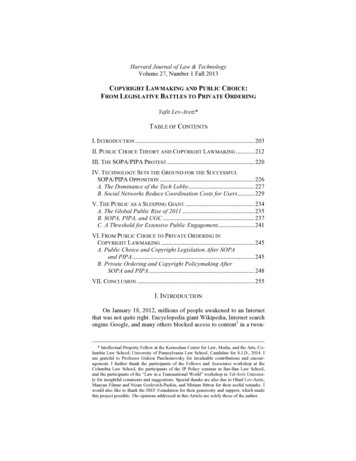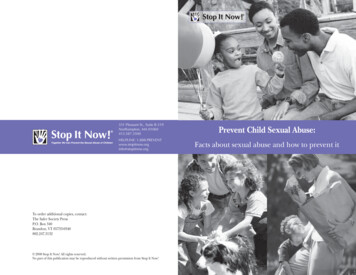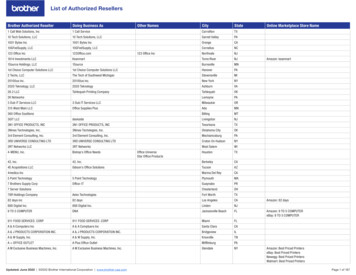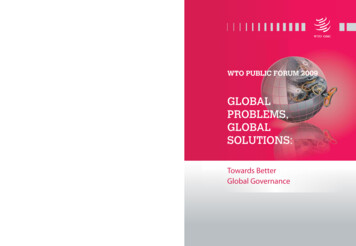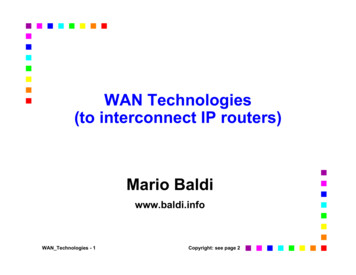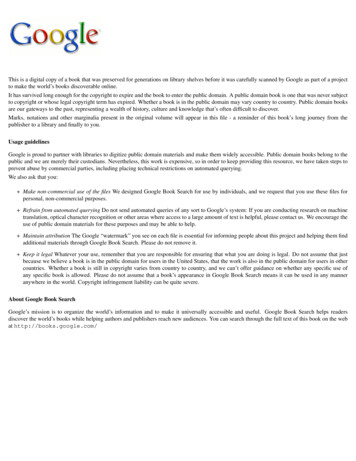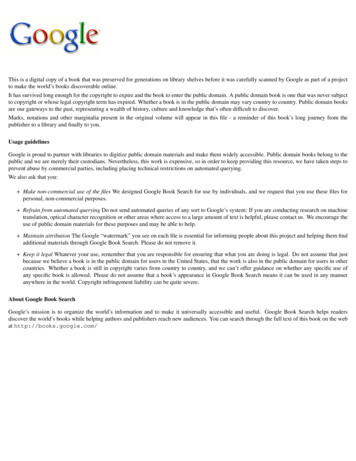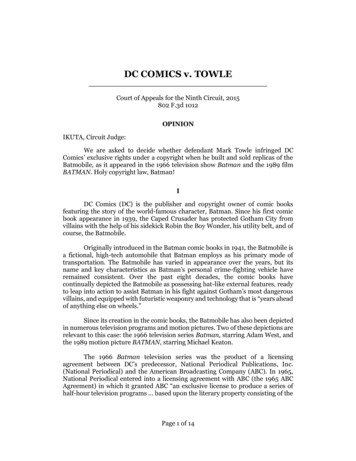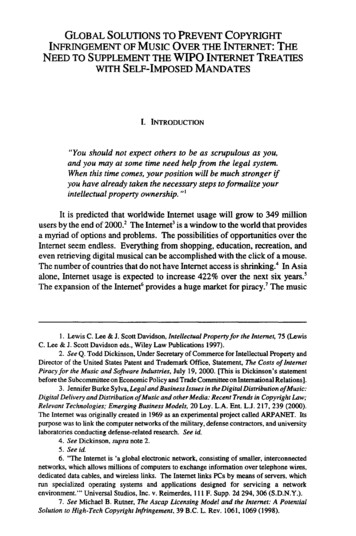
Transcription
GLOBAL SOLUTIONS TO PREVENT COPYRIGHTINFRINGEMENT OF Music OVER THE INTERNET: THENEED TO SUPPLEMENT THE WIPO INTERNET TREATIESWITH SELF-IMPOSED MANDATESI. INTRODUCTION"You should not expect others to be as scrupulous as you,and you may at some time need help from the legal system.When this time comes, your position will be much strongerifyou have already taken the necessary steps to formalize yourintellectualproperty ownership."'It is predicted that worldwide Internet usage will grow to 349 millionusers by the end of 2000.2 The Internet 3 is a window to the world that providesa myriad of options and problems. The possibilities of opportunities over theInternet seem endless. Everything from shopping, education, recreation, andeven retrieving digital musical can be accomplished with the click of a mouse.The number of countries that do not have Internet access is shrinking.' In Asiaalone, Internet usage is expected to increase 422% over the next six years.'The expansion of the Internet 6 provides a huge market for piracy The music1. Lewis C. Lee & J. Scott Davidson, IntellectualPropertyfor the Internet, 75 (LewisC. Lee & J. Scott Davidson eds., Wiley Law Publications 1997).2. See Q. Todd Dickinson, Under Secretary of Commerce for Intellectual Property andDirector of the United States Patent and Trademark Office, Statement, The Costs of InternetPiracyfor the Music and Software Industries, July 19, 2000. [This is Dickinson's statementbefore the Subcommittee on Economic Policy and Trade Committee on International Relations].3. Jennifer Burke Sylva, Legal andBusiness Issues in the DigitalDistributionof Music:DigitalDelivery andDistributionofMusic and otherMedia: Recent Trends in Copyright Law;Relevant Technologies; Emerging Business Models, 20 Loy. L.A. Ent. L.J. 217, 239 (2000).The Internet was originally created in 1969 as an experimental project called ARPANET. Itspurpose was to link the computer networks of the military, defense contractors, and universitylaboratories conducting defense-related research. See id.4. See Dickinson, supra note 2.5. See id.6. "The Internet is 'a global electronic network, consisting of smaller, interconnectednetworks, which allows millions of computers to exchange information over telephone wires,dedicated data cables, and wireless links. The Internet links PCs by means of servers, whichrun specialized operating systems and applications designed for servicing a networkenvironment."' Universal Studios, Inc. v. Reimerdes, 111 F. Supp. 2d 294, 306 (S.D.N.Y.).7. See Michael B. Rutner, The Ascap Licensing Model and the Internet: A PotentialSolution to High-Tech Copyright Infringement, 39 B.C. L. Rev. 1061, 1069 (1998).
IND. INT'L & COMP. L. REV.[Vol. 12:1industry has suffered a great deal from copyright infringement on the Internet.8Internet Service Providers ("ISPs") 9 and services such as Napster "0are beingblamed for most of this piracy. I will refer to Napster as an ISP even thougha recent court decision said Napster plays a more active role in facilitating filesharing than an ISP.I" Theories of Third Party Liability for Infringement canapply to both and will therefore be the focus.This is not a problem that can be isolated in a single country, its reachhas no boundaries.' 2 Because of the ease and speed of the Internet, piracy overthe Internet crosses borders more freely than any other type of commerce orcrime. The copyright holder may very likely be in one country, the violatorlocated in another and the ISP in yet another. Copyright infringement on theInternet is a global problem that begs for global solutions. 4It is almost impossible to regulate or enforce a crime governed by somany different laws and that crosses many jurisdictions in the process. 5 Themusic industry is appealing to the courts and the legislature to do somethingabout copyright infringement. 16 Shared information contributes to the growthof a nation's intellectual property and the lack of access to copyrightedmaterial impinges on that basic principle. 7 "Limiting access to the works bymeans of technological gates and digital envelopes creates a risk ofestablishing a climate in which only those who pay will benefit from creative8. See Reimerdes, 111 F. Supp.2d at 306. The Recording Industry Association ofAmerica reports estimated losses of 22 billion to the U.S. copyright industries worldwide frompiracy. 'These losses mean lost income for creative Americans - authors and composers - aswell as lost jobs, revenues and foreign royalties for American workers and industry." Id.9. "An ISP is a company or service that connects subscribing users to the Internet,usually in exchange for subscription fees or as part of a company or non-profit organization(e.g., educational institutions, government offices). Each ISP contains a group of users whosubscribe to its particular system." Rutner, supra note 7, at 1067. See also 17 U.S.C. § 512(k).It defines a service provider as "a provider of online services or network access, or the operatorof facilities therefor, and includes an entity offering the transmission, routing, or providing ofconnections for digital online communications, between or among points specified by a user,of material of the user's choosing, without modification to the content of the material as sentor received." Id.10. . (Dec. 7, 1999).11. See A&M Records, Inc. v. Napster, Inc. 114 F. Supp. 2d 896,919 (N.D. Cal. 2000).The court said that Napster is not an Internet Service Provider because it does not act as a mereconduit for the transfer of files. [The merits of this claim will not be argued in this Note].12. See Rutner, supra note 7, at 1069. "Internet Transmission has been global since theearly 1990's." Id. at 1068.13. See id. at 1069.14. See Rutner, supra note 7, at 1069.15. See id. Copyright laws generally do not extend beyond the source country'sjurisdictional boundaries, unless by international treaty. See id.16. See id.17. See Sylva, supra note 3, at 229.
2001]GLOBAL SOLUTIONS TO PREVENT COPYRIGHT INFRINGEMENT127works."' 8 A balance needs to be struck between ensuring that consumers haveeasy access to music without imposing unreasonable burdens on thetechnology and still ensuring that the music industry receives the incentive itneeds to continue creating new music."Copyright provides essential incentives for authors and artists todevelop creative new works by ensuring their rights will be respected as theymake their works available on-line."' 9 International treaties play a vital rolein setting standards to protect copyrights. The two most recent treaties thatattempt to do this are the WIPO Internet Treaties. 20 The treaties provideprotection to domestic works abroad and give authors the exclusive right toauthorize their works for availability over the Internet.2' The treaties cannotbe effective to combat Internet piracy in the music industry unless everycountry that has Internet access follows the standards set out in the WIPOInternet Treaties. Even with ratification, the treaties still fall short becausethey lack enforcement standards. The violators not only have to be identified,the proper jurisdiction of law also has to be determined.22 International treatieswill clearly provide important standards to protect the music industry, butcopyright holders must do everything possible to prevent an infringement inthe first place.The high-speed changes in technology will not allow the music industryto rely on treaties that take years to go into effect, or court decisions that maytake just as long and are even more unpredictable. The music industry needsto supplement governments' intervention by self imposing mandates to preventinfringement. Shutting down ISP's through court action will not stop thepiracy.23 The music industry must protect itself by implementing preventiondevices before their work reaches the international market.Part II of this Note familiarizes the reader with the problem of copyrightinfringement over the Internet, specifically in the music industry. It proceedsto discuss existing copyright laws in the United States, Japan, and GreatBritain. It further considers the dilemma faced by ISP's and provides reasonswhy a courtroom is not the proper battleground. Part III briefly chroniclesinternational copyright protection but focuses on the most recent internationaltreaties, the WIPO Internet Treaties. The major relevant provisions of each18. Id.19. WIPO CopyrightTreaty: What is it and Why it Was Imperativefor the U.S. to Ratifythe Treaty, availableat http://www.bsa.orgipolicy/copyright/wipoLnew.htm. (Sept. 5, 2000).20. See World Intellectual Property Organization Web Page, available athttp://www.wipo.orgL.21. See Wendy M. Pollack, Note, Tuning In: The Future of Copyright ProtectionforOnline Music in the Digital Millennium, 68 Fordham L. Rev. 2445, 2463 (2000).22. See Rutner, supra note 7, at 1069.23. See Rutner, supra note 7, 1070. "Individual infringers often do not have enoughassets to make legal action worthwhile. [Miost infringing parties are not large corporations, butrather individual copies. Consequently, a copyright holder is often left uncompensated fornumerous infringements of his or her copyrights." Id.
IND. INT'L & COMP. L. REV.[Vol. 12:1treaty are addressed. Part IV analyzes the ratification and enforcementproblems that arise with relying on international treaties to fight copyrightinfringement over the Internet, and provides reasons why international treatiesshould never mandate global enforcement mechanisms. Part V examinespossible solutions that copyright holders should use to fight the piracy andsuggests that self imposed mandates are the best way to safeguard copyrightsin the global environment of the Internet. Part VI concludes the Note byproposing that international treaties should never mandate global enforcementmechanisms for copyright infringement because that should be determined bythe societal needs of individual countries. Finally, the Note suggests that themusic industry is responsible for protecting its work and should self imposemandates for technical protection of digital music.II. THE INTERNET, THE MUSIC INDUSTRY AND COPYRIGHT INFRINGEMENTA.GenerallyIt has been argued that copyright law does not make sense in the Internetenvironment because of the ease of copying and the great difficulty ofdetecting infringement on the Internet. 24 On the other side of the argument areclaims that even the most routine functions such as forwarding e-mail andbrowsing web pages are technical infringements under many country'scopyright laws. 25 "Obtaining copyright protection for materials requires verylittle effort. Avoiding infringement is the most challenging task. ' 26Copyright is a form of protection provided by law. It is defined as a"statutory protection of an artist's or writer's work, giving the creator (or theholder of the copyright) the right to regulate the publication, multiplication, oruse of the copyrighted material for a certain period of time. It is an incorporealright; i.e., a right to something intangible. "27 The ease of which digital musiccan be accessed and infringed over the Internet threatens the benefits of boththe music industry and consumers. Recent lawsuits against ISP's havethreatened to restrict advances in technologies and hamper creative works byartists.Retrieving sound recordings via the Internet is relatively easy, given theright equipment. The technology has already been created and the devices canbe purchased at your local computer store. Copyrighted music can bedownloaded or uploaded on the Internet. An author or copyright holder canupload the material in order to reach a broad range of users, or a non-copyright24. See Lee, supra note 1, at 77-78.25. See id.26. Id. at 78.27. Gilbert Law Summaries Pocket Size Law Dictionary 65 (1997).
2001]GLOBAL SOLUTIONS TO PREVENT COPYRIGHT INFRINGEMENT129holder who owns a copy of the work can also upload the material.28 The musicis then downloaded by anyone who has access to the Internet and the righttechnical devices." If the work is protected and not uploaded by the copyrightholder, a personwho downloads the material may be liable for copyright30infringement.Information on the Internet that is downloaded is copied material, butthat may not necessarily mean an infringement of copyright has occurred. Aclaim of infringement has to be based upon the copyright owner's exclusiverights of reproduction. This right is defined differently among nationalcopyright laws. Liability stems from the fixation of materials on a computer'sRandom Access Memory when information is viewed on the Internet.3 1"However, if the copyright owner places his/her work on the Internet, it couldbe inferred that the owner expects other Internet users to read and downloadthe copyrighted work." 32"Digital compression technology makes it possible to store audiorecordings in a digital format that uses less memory and may be uploaded anddownloaded over the Internet.' '33 Compression technology allows data thatoccupies a large amount of space to be compressed into files that can be easilytransferred across the Internet and downloaded onto any computer. 34 Thisprocess appeals to consumers of music who want free access to popular music.A common format used to store the compressed audio files is MP3.35 MP3files are small and they require little time to transfer information. 36 Due to thesize of the files and transfer time, they are well suited for transmission over theInternet.37MP3 is an international format with no ties to a single company.38 Thisformat has become internationally popular, replacing "sex" as the most28. See Pollack, supra note 21, at 2448. Copyright holders typically upload material toreach a broad audience or to promote a forthcoming album. See id.29. See id.30. See id. "Piracy is practiced both by individual consumers making copies for theirown use, and by 'professionals' who seek to make content available on a wide scale." Id.31. See Douglas Reid Weimer, CRS Report for Congress, The CopyrightDoctrineofFairUse and the Internet: Caselaw 3 (March 30, 2000).32. Id.33. NapsterInc., 114 F. Supp.2d at 901.34. See Pollack, supra note 21, at 2449. "'These files retain CD-quality sound no matterhow many copies are made, and can be played through computer speakers any time the listenerwishes to hear them." Id.35. See id. "Free MP3 software applications available on the Internet allow users toupload songs from their own CD collections by 'ripping' the files from their CDs and encodingthem in MP3 format." Id at 2450.36. See id. at 2449.37. See id.38. See Pollack, supra note 21, at 2485.
IND. INT'L & COMP. L. REV.[Vol. 12:1searched word on the Internet.39 MP3 files can be acquired by eitherdownloading audio recordings that are already converted by using an ISP orby using "ripping" software to copy an audio compact disc directly onto acomputer hard-drive. 4 Laws have not had time to catch up with compressiontechnology because it has only been available since 300-MHz processorsblasted into the market.4 ' The music industry's outrage stems from the factthat ISP's, such as Napster, enable copying and distribution of copyrightedmusic that has not been authorized.42 MP3 offers no protection againstunauthorized copying, use, or distribution of music unless it contains acopyright management system.43Existing LawsB.An "International Copyright" does not exist.' Copyright protectionthroughout the world depends largely upon the laws of the particular countrywhere the infringement takes place.45 The common practice for those whowant to protect their work is to register for protection anywhere it is used, sold,manufactured, or licensed.46 This practice is very expensive and usuallyelusive due to policing and enforcement problems. 47 A greater problem hasdeveloped with the advent of the Internet. It is impossible to predicteverywhere digital music will be uploaded or downloaded. A copyright is notexpected to understand or monitor copyright laws throughout the world.International treaties and conventions have tried to extend copyright protectionin simplified form.45 Such treaties fall short of standardizing protection to39. See id. at 2446. MP3 is more likely to be used by unsigned bands who want to gettheir music to a wide audience. See id. at 2450.40. See Napster, Inc., 114 F.Supp.2d at 901. "ripping software compresses the millionsof bytes of information on a typical CD into a smaller MP3 file that requires a fraction of thestorage space". Id.41. See Pollack, supra note 21, at 2450.42. See Riaalcurrentissues, available at http://www.riaa.com/Napster.cfm. (Sept. 20,2000).43. See Pollack, supra note 21, at 2450. "Digital rights management is an industry termused to describe the attempt by content providers of copyrighted materials to preserveauthorship of a digital work." Id.44. See U.S. Copyright Office, Copyright basics (2000).45. See id. See also Lee, supra note 1, at 76. In Germany, the only claim that can bemade against a German in respect of an unlawful act perpetrated abroad are those that wouldbe actionable under German law. See id. at 244. And this also states that the EU Commissionand the U.S. take different views in describing temporary copying of a document from theInternet into a PC. The U.S. describes it as reproduction while it regards keeping data availableas dissemination. The EU advocates a right to digital distribution. See id.46. See Lee, supra note 1, at 285.47. See id.48. See U.S. Copyright Office, supra note 44.
2001]GLOBAL SOLUTIONS TO PREVENT COPYRIGHT INFRINGEMENT131ensure universal protection and enforcement because it is impossible for themto be comprehensive throughout the world.The courts in many countries have attempted to get involved with theissue of copyright infringement of music on the Internet, with disappointingresults for everyone involved.49 This issue is more properly the domain of thelegislature than that of the court. When the courts get involved it only makesinternational standards harder to apply.50 Countries talk to one another inefforts to balance global problems and to develop solutions. There are amultitude of examples of international conferences and communicationsbetween leaders of countries on global issues.5 Courts of one country do notdiscuss the global impact of decisions with courts of other countries.Legislation can be implemented to combat global problems, court decisionsonly affect its respective jurisdictional boundaries. Even wide sweepingdecisions, such as those made by the United States Supreme Court, only affectthe jurisdiction of the United States. The Internet has presented new problemsand the courts have not had time to catch up. Even though legislationimplemented in a particular country generally only affects that particularcountry, the purpose of legislation often has a global reach.52 Internationalstandards, such as the WIPO Internet Treaties, cannot be implemented withoutnational legislation.531.United StatesThere is no state copyright law in the United States; it is governedexclusively by Title 17 of the U.S. Code.' The limitations of liability relatingto material online are set out in § 512." Congress has enacted legislation toprotect copyrights from infringement over the Internet.56 This is an ongoingprocess that requires attention now and well into the future. Sound recordings49. See generallyNapster, Inc., 114 F.Supp.2d 896. The court defers to the legislature.See id.50. See Rutner, supra note 7, at 1070.51. See generally WIPO Webpage, supra note 20. (General information and lists ofinternational conventions and treaties).52. See Rutner, supra note 7, at 1070.53. See WIPO Webpage, supra note 20.54. See Lee, supra note 1, at 9.55. See 17 USCS §512 (2000). (provisions scattered throughout code).56. See H.R. 3456, 106th Cong. (1999). Known as the "Digital Theft Deterrence andCopyright Damages Improvement Act of 1999," this act amended the Federal copyright lawwith respect to the statutory damages available for copyright infringement. See id. See also,Pub. L. No. 105-304, 112 Stat. 2860 (Oct. 28, 1998). Known as the "Digital MillenniumCopyright Act of 1998," this act implements two 1996 World Intellectual Property OrganizationTreaties: The WIPO Internet Treaties. See id. See also U.S. Copyright Office, able ve/. (This site provides developments incopyright legislation during the 105th Congress and the 106th Congress).
IND. INT'L & COMP. L. REV.[Vol. 12:1were given protection for the first time in 1971, but public performance rightswere not protected until digital technology made the change necessary in1995.57 The United States Constitution grants Congress the enumerated powerto give exclusive copyrights to authors, inventors and creators through ArticleI,Section 8, Clause 8. s'The fair use doctrine in copyright law was codified in the Copyright Actof 1976."9 The doctrine sets out four criteria to determine if a use is aninfringing use: "1) the amount and character of the use; 2) the nature of thecopyrighted work; 3) the amount copied in relation to the whole copyrightedwork; and 4) the effect of the copying on the potential market for thecopyrighted work.' ' 0 Since American courts have treated the Internet as aform of communication, the four fair use factors are generally applied todetermine if an infringement has occurred over the Internet. 6' Therefore,although copyright owners possess various exclusive ownership rights, undercertain circumstances, the fair use doctrine permits the unauthorized use ofcopyrighted works.62 It is unclear whether the fair use doctrine applies toonline music infringement.6 3 Although the fair use doctrine can be a defenseto some copyright infringements, the doctrine probably will not work as adefense to copyright infringements of digital music because of the verbatimreproduction of the copies.'The Trade-Related Aspects of Intellectual Property Rights ("TRIPS")Agreement was implemented in the United States in 1994 when PresidentClinton signed the Uruguay Round Agreements Act.6' This substantivelyaltered copyright law in the United States because it restored copyrightprotection to foreign works which are protected by their "source" country but57. See Arlene Bielefield & Lawrence Cheeseman, Technology and Copyright Law: AGuidebookforthe Library,Research,and TeachingProfessions,29 (Neal-Schuman Publishers,Inc. 1997).58. U.S. CONST. Art. I, § 8, cl.8. "To promote the Progress of Science and useful Arts,by securing for limited Times to Authors and Inventors the exclusive Right to their respectiveWritings and Discoveries."59. See Weimer, supra note 31, at 2. "Fair Use means that a copyright owner's exclusiverights are technically violated, but other circumstances justify the violation." Id. See also Lee,supra note 1, at 72.60. Weimer, supra note 31, at 2.61. See id.62. See id.63. See Pollack, supra note 21, at 2459. "The answer may [d]epend on whether or notan entire song is copied, and most likely turns on whether the use is a private or commercialone." Id.64. See Stacy Snowman & David H. Bernstein, Protecting Your Intellectual Property 193,(Practising Law Institute 1997).65. See id. at 147.
2001]GLOBAL SOLUTIONS TO PREVENT COPYRIGHT INFRINGEMENT133which are in the public domain' in the United States.67 The Restored Work6"is entitled to all the remedies of the United States Copyright Act. 69 The Actincluded a single exception to immediate enforcement for reliance parties,70persons who have relied in good faith on the public domain status of thework.7 In the music section of the Act, compulsory licensing is required.72The Digital Performance Right in Sound Recordings Act was enacted in1995. 7 This act requires a party to consider both the record company's rightsin the recording as well as the underlying music publisher's publicperformance or distribution rights prior to making a digital transmission of asound recording." An interactive service is one of three types of digitalperformances distinguished in the Act. It defines an interactive service as "onethat enables a member of the public to receive, on request, a transmission ofa particular sound recording chosen by or on behalf of the recipient."75 TheAct grants a public performance right to copyright holders of sound recordingswhen they are digitally performed by an interactive service.76 The Act helpsto ensure that copyright owners are compensated for distribution of their workby digital transmission." This provides only limited protection because theonly way this can work is if the user is downloading a song from a companythat employs a compression technology.78In the United States, copyright protection applies regardless of thenationality or domicile of the author.79 The protection also applies if one ormore of the authors of the work is a national or domiciliary of the UnitedStates' The United States copyright law only offered protection to United66. Id.67. See id. at 147.68. "The Restored Work will be that remainder of the copyright that the work would havehad in the United States, but for the loss of the U.S. copyright." Id. at 148.69. See id.70. Id. To qualify as a reliance party you must: "a. used the Restored Work both beforeand after January 1, 1996; and b. made or acquired copies of the Restored Work before January1, 1996; c. bought or acquired at any time an interest in a derivative work based upon theRestored Work; or, d. otherwise acquired significant assets (multiple copyrights, bulkassignment, inventory) from another Reliance Party." Id.71. See id.72. See id.73. See Pub. L. No. 104-39 (1995).74. See id.75. Id.76. See Pollack, supra note 21, at 2454. For example, if a user requests a song from anInternet site that is licensed to release a copy for a fee, the Internet site pays a subscription feeto the record company for allowing that user access. See id.77. See id. at 2455.78. See id.79. See U.S. Copyright Office, supra note 44.80. Id.
IND. INT'L & COMP.L. REv.[Vol. 12:1States citizens and residents until 1891." Copyright law in the United Stateshas evolved from a bare bones structure of protection of domestic copyrights,to an intricate system that includes protection for foreign works.The Digital Millennium Copyright Act of 1998 (DMCA)"2 implementsthe WIPO Copyright Treaty and the WIPO Performances and PhonogramsTreaty in Title I of the Act.*3 The Act also has important domestic provisions.Title II, the "Online Copyright Infringement Liability Limitation Act," createslimitations on the liability of online service providers for copyrightinfringement when engaging in certain types of activities." 4 The crucial partof this is that it provides "safe harbors" for ISPs under four sets ofcircumstances.8 5 The Act also includes three other articles that address othersignificant copyright-related issues.86 By providing "safe harbors", "title II ofthe DMCA forces copyright owners to target the actual infringers, thoseindividuals who upload songs against an artist's will, instead of giving theowners a liability catch-all in the ISPs."' However, this is not a saving gracefor ISPs. There are gaps in the Act that may expose ISPs to liability, and sinceISPs generally have "deep pockets", the costs of litigation may be justified forcopyright holders."881. See Bielefield, supra note 57, at 26.82. Pub. L. No. 105-304, 112 Stat. 2860 (Oct. 28, 1998).83. See id. See also, Susan A. Mort, Article, The WTO, WIPO, & the Internet:Confounding the Borders of copyright and Neighboring Rights, 8 Fordham IntellectualProperty, Media & Ent. L.J. 173, 175 (1997). (Although the United States signed the Treaties,it was not among the initial signatories because of limitations in the delegation's negotiatingauthority).84. See id.85. See Pollack, supra note 21, at 2465. "First, section 512(a) limits the liability of ISPsin transitory digital network communications as long as the ISP is acting automatically withrespect to the user and the material. Second, section 512(b) removes liability for systemcaching, which is the practice of temporarily storing copies of popular Internet material locallyin the ISP's server so that the ISP's users can access that material more readily. The thirdlimitation on liability is for information residing on systems or networks at the direction ofusers. Lastly, section 512(d) provides a safe harbor for information location tools. Thissection applies to hyperlinks, online directories, search engines, and other location tools of thatnature." Id.86. See Mort, supranote 83, at 176. See also The Digital Millennium Copyright Act of1998, U.S. Copyright Office Summary (December 1998). Title III, the "Computer MaintenanceCompetition Assurance Act," creates an exemption for making a copy of a computer programby activating a computer for purposes of maintenance or repair. Tide IV contains sixmiscellaneous provisions, relating to the functions of the Copyright Office, distance education,the exceptions in the Copyright Act for libraries and for making ephemeral recordings,"webcasting" of sound recordings on the Internet, and the applicability of collective bargainingagreement obligations in the case of transfers of rights in motion pictures. Title V, the "VesselHull Design Protection Act," creates a new form of protection for the design of vessel hulls.See id.87. Pollack, supranote 21, at 2466.88. See Sylva, supra note 3, at 225.
2001]GLOBAL SOLUTIONS TO PREVENT COPYRIGHT INFRINGEMENT2.135JapanJapan's copyright system has its origins of development in 1869 whenit enacted the Publishing Ordinance, which provided for protection ofcopyright and regulation on publishers.8 9 What is now referred to as the OldCopyright Law was enacted in 1899 and is said to be "the first mode
C. Lee & J. Scott Davidson eds., Wiley Law Publications 1997). 2. See Q. Todd Dickinson, Under Secretary of Commerce for Intellectual Property and Director of the United States Patent and Trademark Office, Statement, The Costs of Internet Piracy for the Music and Software Industries, July 19, 2000. [This is Dickinson's statement
